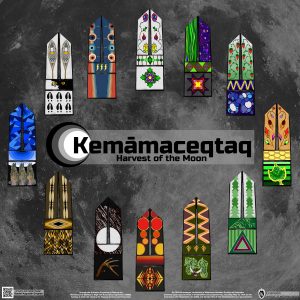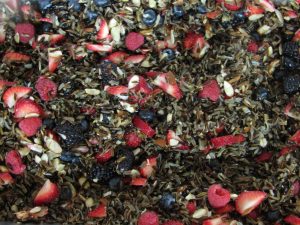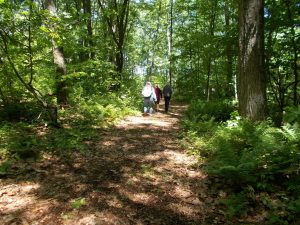The National Centers for Disease Control and Prevention awarded the University of Wisconsin-Madison Division of Extension $2.5 million over 5 years to work with partners to improve the health of residents in Menominee County/Nation.
The project is named Kemāmaceqtaq: We’re All Moving and focuses on increasing access to healthier foods and expanding access to safer locations for physical activity.
This project uses evidence-based strategies grounded in Menominee cultural values to address chronic health problems in the community.
The grant started in October 2018 and continued through September 2023. Download the Menominee Project Summary for an overview of grant activities.
An additional five years of funding was awarded for October 2023 through September 2028. Learn more about current grant strategies in our grant overview.
Strategies
Collaborate with partners to improve the food system to increase access to healthier food.
Processing and Preserving Network
The Processing and Preserving Network was launched by the Kemāmaceqtaq team in 2019 and consists of representatives from Menominee County/Nation Division of Extension and tribal nations throughout the state of Wisconsin. Meeting primarily online, more than 80 participants from 6 tribal nations in Wisconsin have come together to discuss topics like safe food handling, preserving venison, and a virtual tour of Oneida Cannery. The goals of the network include promoting and increasing access to traditional foods in tribal communities.
Members of the Kemāmaceqtaq team also participated in a virtual train-the-trainer series with preservation experts from Michigan State University and are sharing this learning with the network and locally. Participants in the network have worked to collect and make accessible recipes, sourcing information, and other resources for processing and preserving within tribal communities.
Read more about the network in our success story: Community Kitchens and an Intertribal Processing and Preserving Network: Space and Sharing to Revive Menominee Food Practices
Harvest of the Moon
The Harvest of the Moon was created to strengthen connections to food through the integration of Menominee language, the Menominee Moons, Menominee art, and Indigenous recipes. Harvest of the Moon materials can be used in a variety of community settings, including schools, afterschool programs, senior meal sites, 4-H meetings, recreation centers, and other sites.
Daniel Augustin Grignon, an enrolled member of the Menominee Indian Tribe of Wisconsin, graduated from the Institute of American Indian Arts with a Bachelor of Fine Arts-Studio Arts. His favorite mediums include printmaking, sculpture, and filmmaking. He is a recognized community artist and sought out by many for his thoughtful designs. Mr. Grignon is a Menominee language learner and is passionate about language revitalization. He was integral to Harvest of the Moon design elements and infused Menominee language, culture, and material culture into the finished educational book. Harvest of the Moon is uniquely Menominee and we thank Mr. Grignon for his creativity and contributions to this project.
To learn more about Harvest of the Moon and download materials visit the official Harvest of the Moon webpage. Read more about Harvest of the Moon in our year 3 success story.
- The team is currently developing Harvest of the Moon 2.0! Check back this summer for 13 additional Indigenous foods aligned with each of the Menominee moons. Materials will include new recipes, learning activities, and Menominee language and culture.
Community Kitchen
The Kemāmaceqtaq team aims to create community spaces that support the revival of Menominee traditional food practices. In August of 2020, the Department of Agriculture and Food Systems of the Menominee Indian Tribe of Wisconsin, in partnership with the UW-Madison Division of Extension Menominee County/Nation, completed a survey of community members about the development of a community kitchen. As documented through the survey, community members have had a longstanding interest in the processing and preserving of Menominee fruits, vegetables, wild rice, game and fish, and in accessing space and learning opportunities to regain these skills. After completing a scan of community assets for food processing and engaging with local partners, the Kemāmaceqtaq team is working to establish a community kitchen with freely available equipment for members of the Menominee community to use. This effort will strengthen connections to traditional Menominee foods, revitalize cultural ways harmed by colonial legacies, and further support the physical health and holistic well-being of Menominee community members.
Read more about this approach in our success story Community Kitchens and an Intertribal Processing and Preserving Network: Space and Sharing to Revive Menominee Food Practices.
Community Health and Wellness Guide
The updated Community Health and Wellness Guide includes information about community resources, departments, and agencies. It serves as a resource to promote healthy living activities and resources in the community. Featured artwork was designed by a local high school youth art group “Mamaceqtaw Asaqtaw”. Download the guide here.
Kehtekaewak Farmers’ Market
The Kehtekaewak (“They Eat Food”) Farmers’ Market seeks to increase the healthy and locally grown foods available to the Menominee community while supporting local growers and food businesses. The Kemāmaceqtaq project supports the College of Menominee Nation in providing educational resources and technical support for local growers to enable local food production. Since 2021, CMN and the Kemāmaceqtaq project have collaborated to increase the number of growers able to participate in the Farmers’ Market by providing grower stipends, soil testing services, seeds, and other supplies necessary to improve growing conditions. The Kemāmaceqtaq project has also provided for increased market signage and social media about the market, including vendor highlights on Facebook.
Read more about our work at the farmers market in our success story: Kahtekaewak Farmers’ Market – Growing Community and Local Foods to Combat Food Apartheid.
The Kemāmaceqtaq Harvest of the Moon (HoM) team has set up a monthly booth at the Farmers’ Market. The HoM team offers free samples, recipe cards, distributions of the featured fresh food, and educational activities aligned with the current moon, for example, Mēn Kēsoq or “Blueberry Moon” for the August moon. The program has helped to increase food knowledge in the community while supporting local growers at the Farmers’ Market. Other special activities at the market have featured cooking demonstrations with Indigenous chefs, vaccination education, and voter promotion.
Healthy Food Stores
In June of 2022, the Kemāmaceqtaq team assessed the availability of fresh, healthy, and traditional foods to the community at food stores. The assessment looked at various aspects of selling healthy food, such as the availability of fresh fruits and vegetables, how products are displayed, and whether WIC and SNAP services are accepted. The team used a list of Menominee foods, including blueberries, wild rice, and hominy corn, to examine the availability of traditional foods.
Based on the results of the assessment, the Kemāmaceqtaq team provided recommendations to local food stores on how to improve the food environment. Partners such as County Health Rankings & Roadmaps, a program of the University of Wisconsin Population Health Institute, and the United States Department of Agriculture support the researched recommendations. The team developed a toolkit to assist store teams with implementing healthy, evidence-based recommendations to improve access to healthy foods, including fruits, vegetables, whole grains, and native/indigenous foods. Download the Strategies for Healthy Food Stores in Menominee County and Nation toolkit to learn more.
Establish nutrition standards in key community settings
Nutrition Policies
Kemāmaceqtaq team members are working with community partners and leaders to draft nutrition standards policy language aligned with Food Service Guidelines for Federal Facilities and centering Indigenous and local foods, Menominee language, and culture. Community partners and leaders at four community sites have passed policies to date:
- 4-H Clubs in Neopit and Keshena
- Menominee County courthouse and public facilities building
- Menīkānaehkem, a community organizing group
- Menominee Early Childhood Services – Head Start/Early Head Start
- College of Menominee Nation
You can read more about the incredible work on nutrition standards in the success story: Policies to support sustainability and indigenous foods across Menominee County/Nation.
View this infographic to learn more about how Menominee County government is taking steps to increase traditional and nutritious food offerings as they also work to increase opportunities for movement and engagement with nature that interweaves Menominee language and teachings about local plants.
The Kemāmaceqtaq team continues to provide technical assistance and support to partners who passed policies, including healthy recipes, signage, lunch and learn sessions, and resources like composters and reusable dish bags. The team is also partnering with additional sites to develop and adopt nutrition standards.
Menominee Nicianak 4-H Club Health and Wellness Policy Implementation
Menominee 4-H partnered with FoodWIse, a nutrition education program, to lead cooking classes during 4-H summer programming. There was a K-5th grade beginner cooking class and a 6th-8th grade advanced cooking class. Kids learned about food safety and germs and prepared a variety of recipes, including egg burritos, grilled cheese sandwiches, and banana sushi for beginners and Korean style vegetable pancakes and Misickquatash (Indian Succotash) for advanced learners. The kids rated each recipe using thumbs up or thumbs down voting. 4-H is developing a cookbook based on recipes. These recipes can be used for potlucks, 4-H events, concession stands, healthy snacks/meals for youth and families to make at home. These recipes were designed in alignment with the Kemāmaceqtaq: We are all moving, Menominee 4-H Club health and wellness policies. The cookbook will be distributed through 4-H, food distribution, and community events.
Menominee 4-H developed a committee of young people and adults to provide feedback on how to promote Harvest of the Moon in food retail locations on the reservation. They partnered with Save-A-Lot management to feature a store display highlighting the Harvest of the Moon food each month, store signage, recipes, and a Facebook challenge.
Collaborate with partners to establish new or improved active transit systems, like sidewalks, paths, and bicycle routes
Park Improvement Projects in Neopit and Keshena
Extension Menominee County/Nation convened partners to complete Wisconsin’s Active Community Toolkit assessment tool between April – June 2019. Youth leaders, agency partners, and community partners completed three walking audits during the summer of 2019 to dig deeper into the findings of the Active Community Checklist. Project partners worked collaboratively to leverage community assessment findings to inform the implementation of two park improvement projects planned by the Menominee Indian Tribe in October 2019 – January 2020: Chief Niwopet Park in Neopit and Sturgeon Park in Keshena.
Read about these accomplishments in the success story: Enhancing recreation spaces in Menominee County Nation.
Walking Routes
Community Design Gatherings
In summer 2022, the American League of Bicyclists led a bike safety training for representatives of Community Development, CMN, and MITW Youth Services. Individuals who participated in the training are League of American Bicyclists League Cycling Instructor certified to lead community bike safety classes. This training was a great opportunity to build local capacity to offer bike safety training to community members and advocate for safer communities for bikes.
Team members recruited College of Menominee Nation students to take part in a community design virtual gathering to evaluate the Neopit & Keshena communities and share what future landscape design might look like. Some priority focus areas for this information gathering include: active living, connecting routes to everyday destinations, and enhancing everyday destinations with cultural twists. Much discussion was held around places of hope; these are locations in Keshena and Neopit where students wanted to see more resources allocated to improve signage, increase access, make safer, and include Menominee art.
Bike Safety
In summer 2022, the American League of Bicyclists led a bike safety training for representatives of Community Development, CMN, and MITW Youth Services. Individuals who participated in the training are League of American Bicyclists League Cycling Instructor certified to lead community bike safety classes. This training was a great opportunity to build local capacity to offer bike safety training to community members and advocate for safer communities for bikes.
Kemāmaceqtaq team members are working with community partners to order bike racks and install them at key community locations. Collaborating departments include: CMN, Menominee Tribal School, MISD, Woodland Boys & Girls Club, Menominee County, and Community Development.
The Kemāmaceqtaq team is partnering with Menominee videographers to capture and share about our community-based projects. Watch our videos on YouTube: https://www.youtube.com/playlist?list=PLWYkTfJ_LDJaazpvHAipu8LoatBehv0s4
“Indigenous Cooking with Elena Terry” was filmed by Daniel Grignon and edited by Sabrina Hemken.
Contacts
| Name | Role | Location | Contact |
| Amber Canto | Project Director | Madison | amber.canto@wisc.edu |
| Kimberly Nagel | Project Manager | Menominee | kimberly.beaumier@wisc.edu |
| Jennifer Gauthier | Active Transit & Food Standards | Menominee | jennifer.gauthier@wisc.edu |
| Dawn Doperalski | Food Systems & Food Standards | Menominee | dawn.doperalski@wisc.edu |
| Sofie Teller | Youth Engagement | Menominee | sofie.teller@wisc.edu |
| Annette Tourtillott | Project & Communication Support | Menominee | atourtillott@menominee.edu |
| Emily Latham | Communications Specialist | Madison | emily.latham@wisc.edu |
| Amy Washburn | Evaluation | Madison | ahildendorf@wisc.edu |
Follow/Like us on Facebook @ExtensionMenominee







